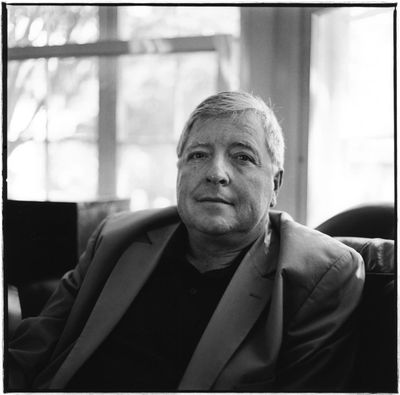James Larew, an attorney in Iowa City, delivered part of these remarks at a February 22 Iowa House public hearing on a bill that would restrict early voting. -promoted by Laura Belin
We live in troubling times.
The good news is that a democracy, such as Iowa’s, is inherently self-correcting.
Here, the people are sovereign.
Inept politicians can be replaced.
Foolish policies can be changed.
Disastrous mistakes can be reversed.
The greater the voter participation, the more likely, the more speedily, self-corrections will be made.
The present voter suppression bills strike at the heart of Iowans’ ability to replace inept politicians, to correct foolish policies, and to reverse disastrous mistakes. The proposed legislation will injure this self-correcting process, if passed, by making it more difficult for Iowans to vote.
What possible questions do these bills answer?
Iowa’s history is an arc, imperfectly designed by people of all political persuasions, covering a period of more than one and one-half centuries, under which citizens have gained increased opportunities to vote and to participate in civic life.
These bills fracture that arc and unsettle that history. Under the proposals, numbers of citizens who, by their votes, would be in a position to minister to the self-corrections of law and policy that Iowa needs, will be reduced by:
It is bitterly ironic, but not by coincidence, that this suppression attack has been made following recent elections in which Iowa has emerged as a voter-turnout leader in the nation.
The bills are offered by a party that, once in control, is determined to maintain that position by reducing the numbers of persons who, in elections, might register their support for policy self-corrections that are so clearly needed in public policy domains such as:
PUBLIC HEALTH: COVID-19: At one time, Iowa presented models to the nation for effective public health practices. But not any longer. Foolish policies—or no policies at all—in this past year have produced highly-visible, humiliating results: some of the highest COVID-19 infection rates the nation have been hosted in Iowa communities, urban and rural, alike.
Our state’s COVID-19 mortality rate (170 deaths / 100,000 residents), perhaps the most objective measure of public health policy efficacy, nearly one year after the COVID-19 infections were first discovered in Iowa, is amongst the highest rate in the upper Midwest, higher than, for example:
Wisconsin (118 / 100,000);
Missouri (133 / 100,000);
Minnesota (115 / 100,000);
Michigan (163 /100,000); and
Nebraska (105 / 100,000).
Concerned Iowans, determined to reverse Iowa’s public health policy race-to-the-bottom, can change that trajectory in local and state elections by voting for new political leadership. Voter suppression supporters perceive that threat.
HOUSEHOLD INCOME: Iowa, with built-in advantages of arterial railroad and national highways criss-crossing its land, of world-class soils, and of a dispersed, highly-educated work force, should be leading the upper Midwest in basic economic opportunities. But, we suffer by comparisons to our neighbors. For example, Iowa’s average household income ($78,411) lags these very same states concerning which the other comparisons are also not favorable:
Wisconsin ($80,674)
Illinois ($92,395)
Nebraska ($80,208)
Minnesota ($93,925)
Michigan ($78,600)
Governmental policies, not natural resources or human capital, have driven these results. Iowans, armed with ballots, are in a position to force the changes that are needed. Fewer voters at the polls will reduce the likelihood of effective challenges to those policies or the elected officials who promoted them. Voter suppression advocates understand this.
AIR AND WATER QUALITY (U.S. NEWS & WORLD REPORT): According to U.S. News and World Report, Iowa has one of the worst rankings for air and water quality in the U.S. (41st). Iowans who have lived here for any length of time have witnessed this deterioration in their every-day lives. We are surrounded by states whose environmental quality very substantially surpasses our own. Here are the rankings of our closest neighbors in that same report:
Minnesota (#6)
Wisconsin (#7)
Missouri (#8)
South Dakota (#11)
Michigan (#14)
How long will Iowans put up with such environmental disparities, when compared to those states that are so close by? Fewer voters participating in elections means the likelihood of needed change is reduced—and voter suppression advocates know this.
ROADS AND BRIDGES. At one time, Iowa’s road system was the envy of the nation—to say nothing of the world. But, not any longer. When traveling in Iowa, one doesn’t need a map or a sign to know when one’s vehicle has crossed a state line. One need only pay attention to the vibration of one’s vehicle, or the quality of a rest stop. We are disgraced by the fact that Iowa leads the nation with the largest number structurally-deficient bridges of any state in the union. Only voters, registering their voices for changes in our transportation policies, can make that change happen. Those voices will be the victims of the voter suppression legislation now-proposed—and, the proponents of this legislation know this.
How promising it would have been had this legislative body, gathered in the Old Supreme Court chamber, called the public on this night to a special meeting to address these kinds of issues: public health; household income; air and water quality; and transportation improvements.
Instead, the voting suppression bills are the priority of legislative leaders.
Voter suppression, the clear purpose of these bills, is but a desperate attempt to delay the inevitable exercise of powers of a sovereign people.
If passed, the laws will slow, but never, in the end, extinguish, Iowans’ ability to replace inept office holders, to change foolish policies and to correct disastrous mistakes.
I would urge legislators to get on the right side of history and to vote against these bills.
James Larew is a private practice attorney who previously served as general counsel and chief of staff to Governor Chet Culver. Top photo of the author published with permission.

